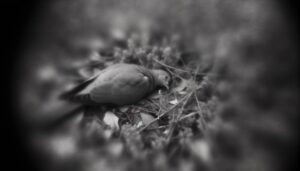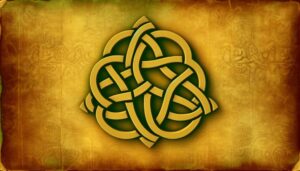What Does the Owl Symbolize in Native American Culture?
The owl holds a complex symbolism in Native American cultures, varying notably across tribes. For the Apache and Cherokee, the owl is often an omen of death.
The Hopi and Zuni see it as a protector and guide, while the Lakota associate it with vigilance and stealth. Universally, the owl is revered as a keeper of wisdom and knowledge, emblematic of deep insight and the ability to navigate darkness.
Its nocturnal nature is linked to uncovering hidden truths and offering protection from harm. These diverse interpretations reflect the owl's multifaceted role in Native American spirituality and cultural teachings, each revealing unique layers of meaning.
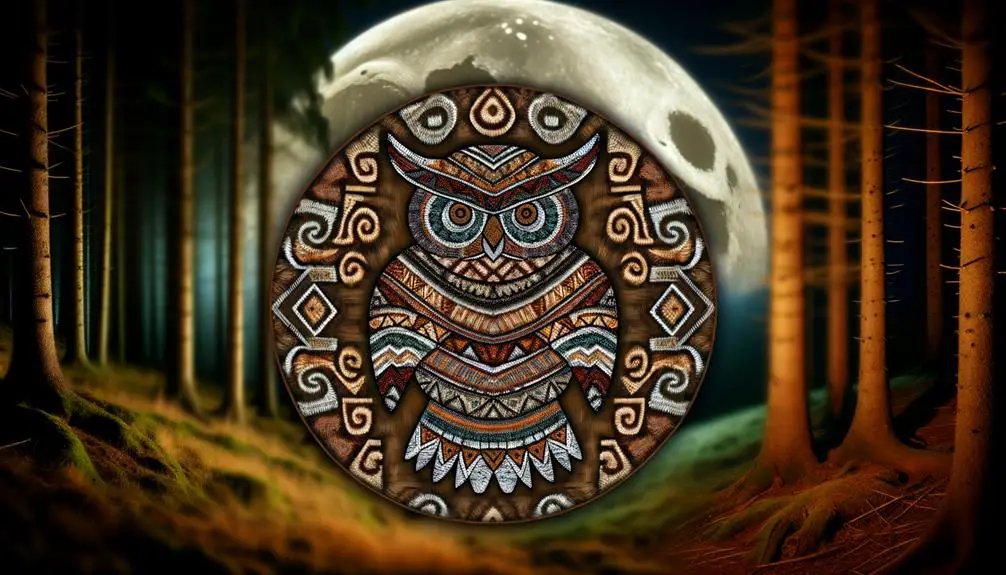
Key Takeaways
- Owls symbolize wisdom and knowledge in many Native American cultures.
- Owls are seen as protectors and guardians against malevolent spirits.
- Different tribes interpret owl sightings as omens of death, protection, or guidance.
- Owls are revered for their ability to navigate and provide insight in darkness.
- They serve as mediators between physical and spiritual realms, guiding souls.
Symbolism in Various Tribes
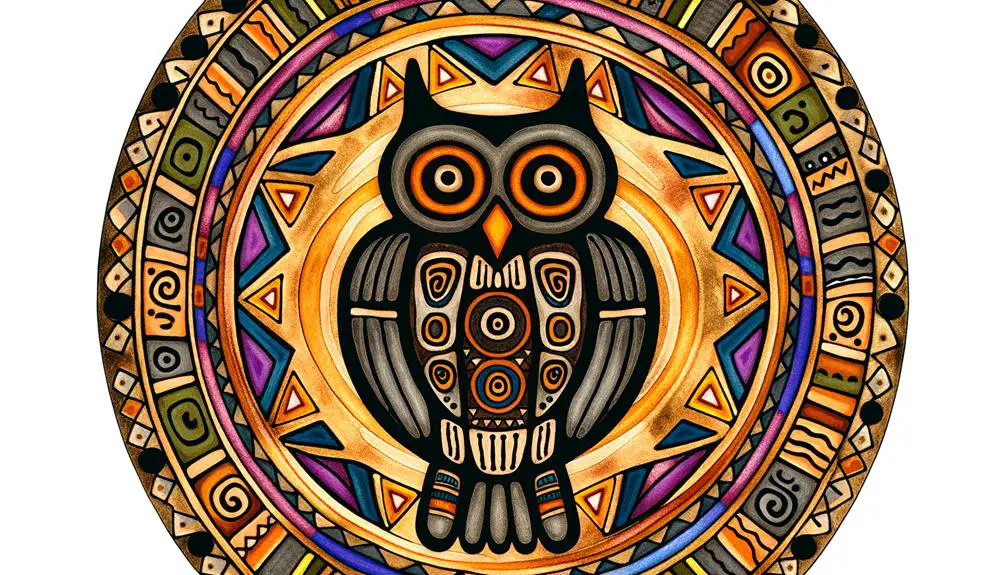
Among Native American tribes, the symbolism of the owl varies greatly, reflecting diverse cultural beliefs and traditions.
For some tribes, such as the Apache and the Cherokee, the owl is seen as an omen of death or a harbinger of ill news.
In contrast, the Hopi and Zuni associate the owl with protection and guidance, viewing it as a guardian spirit.
The Lakota see the owl as a symbol of vigilance and stealth.
These varied interpretations are rooted in each tribe's unique environmental interactions, mythological narratives, and spiritual practices.
Understanding the multifaceted symbolism of the owl within Native American cultures requires a nuanced consideration of these distinct tribal contexts, highlighting the rich tapestry of meanings attributed to this enigmatic bird.
Owl as a Wisdom Keeper
The owl's role as a wisdom keeper in Native American cultures is deeply rooted in its perceived connection to the spiritual and intellectual domains.
This symbolic representation underscores the owl's association with insight, knowledge, and the ability to see beyond the obvious.
Cultural Significance Overview
In Native American traditions, the owl is often revered as a profound symbol of wisdom and knowledge. This reverence is rooted in the owl's nocturnal nature, which associates it with the mysteries of the night and the unseen.
Many tribes view the owl as a guardian of sacred knowledge, capable of guiding individuals through darkness and uncertainty. Its ability to see in the dark metaphorically extends to perceiving truths and insights that are hidden from others. This symbolic association underscores the owl's role as a wisdom keeper, linking it to themes of intuition and heightened awareness.
The owl's significance varies among tribes, but it consistently embodies a deep respect for the knowledge that transcends ordinary understanding.
Symbolic Representation Explained
Owl symbolism as a wisdom keeper in Native American culture is intricately tied to its perceived ability to navigate the darkness, both literal and metaphorical. This nocturnal bird's heightened senses are seen as a metaphor for discernment and insight, allowing it to reveal truths hidden in obscurity.
Tribes like the Hopi and Lakota often equate the owl with deep knowledge and intuitive understanding. The owl's silent flight and keen vision further underline its role as a guide through life's uncertainties. Such attributes make the owl a potent emblem of wisdom, revered for its capacity to perceive what others cannot.
Therefore, the owl's presence in Native American symbolism serves as a reminder of the profound value of wisdom and introspection.
Spiritual Significance
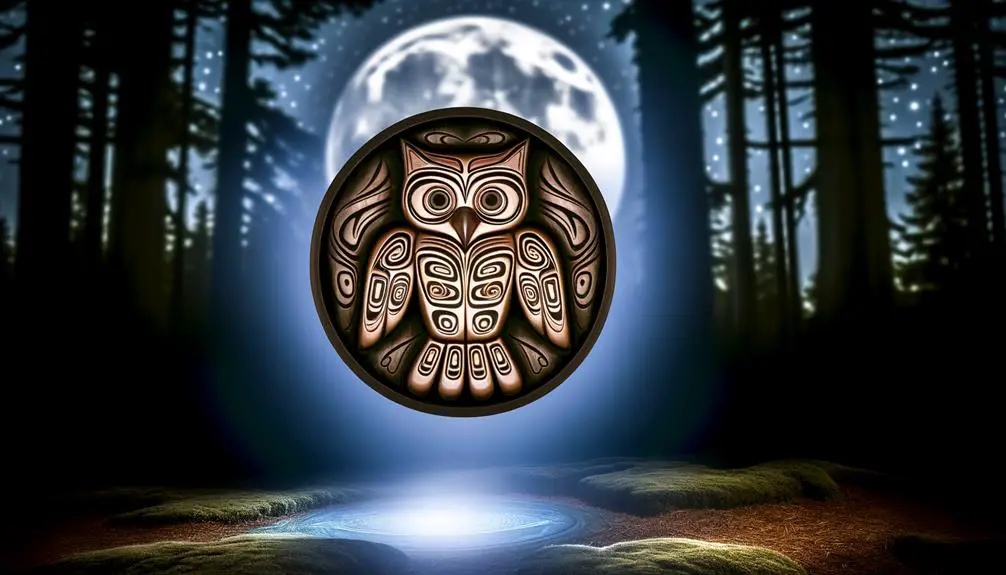
The spiritual significance of the owl in Native American culture encompasses themes of wisdom and knowledge, providing protection from harm, and establishing a connection to ancestors.
These attributes are not isolated but interwoven into the cultural fabric, reflecting the owl's multifaceted role in spiritual beliefs.
Wisdom and Knowledge
Symbolizing profound wisdom and deep knowledge, the Native American depiction of the owl reflects its revered status within various tribal cultures. This symbolic representation is multi-faceted, showcasing the owl's association with several key aspects of wisdom and knowledge:
- Night Vision: Owls are known for their exceptional ability to see in the dark, metaphorically representing insight and the ability to perceive hidden truths.
- Silent Flight: The owl's silent flight underscores the importance of quiet observation and the acquisition of knowledge without drawing attention.
- Lone Hunter: As solitary creatures, owls exemplify the pursuit of knowledge through introspection and self-reliance.
- Mythological Wisdom: Many tribes believe owls possess ancient wisdom, passed down through generations, symbolizing a deep connection to ancestral knowledge.
This layered symbolism underscores the owl's esteemed place in Native American spirituality.
Protection From Harm
In various Native American cultures, the owl is often regarded as a spiritual guardian, believed to offer protection from harm through its mystical attributes. This belief is grounded in the owl's nocturnal nature and its reputed ability to see beyond the visible, symbolizing heightened awareness and vigilance.
Many tribes consider the owl a watchful protector against malevolent spirits and physical dangers. Its presence in dreams or visions is interpreted as a warning or a guide towards safety. The owl's silent flight and keen senses are emblematic of an unseen shield, providing a sense of security.
Through ceremonial practices, individuals invoke the owl's protective qualities, seeking to harness its spiritual power to guard against unforeseen threats.
Connection to Ancestors
Many Native American tribes perceive the owl as a vital link to their ancestors, imbuing it with profound spiritual significance. The owl is often seen as a mediator between the physical and spiritual realms, serving as a guide for souls moving between worlds. This belief underscores the owl's role in maintaining a connection with past generations and honoring ancestral wisdom.
The following points highlight this connection:
- Symbolic Messenger: Owls are viewed as carriers of messages from ancestors.
- Spiritual Guides: They are considered spiritual guides who help navigate life's challenges.
- Embodiments of Wisdom: Owls symbolize the accumulated knowledge of past generations.
- Ritualistic Presence: They are often featured in rituals aimed at invoking ancestral spirits.
This spiritual connection reinforces the owl's revered status in Native American culture.
Foresight and Protection
The Native American symbol for the owl is often associated with foresight and protection, reflecting the owl's perceived wisdom and vigilant nature. This symbolic attribution is grounded in the owl's nocturnal habits and keen eyesight, which allow it to navigate and hunt efficiently in darkness.
Consequently, the owl is seen as a guardian capable of perceiving hidden threats and providing guidance through uncertain times. In various tribes, the owl's presence serves as a protective emblem, safeguarding individuals and communities from potential dangers.
This protective role often extends to spiritual domains, where the owl is believed to offer insights that transcend the physical world, ensuring the safety and well-being of those it watches over.
Omens and Interpretations
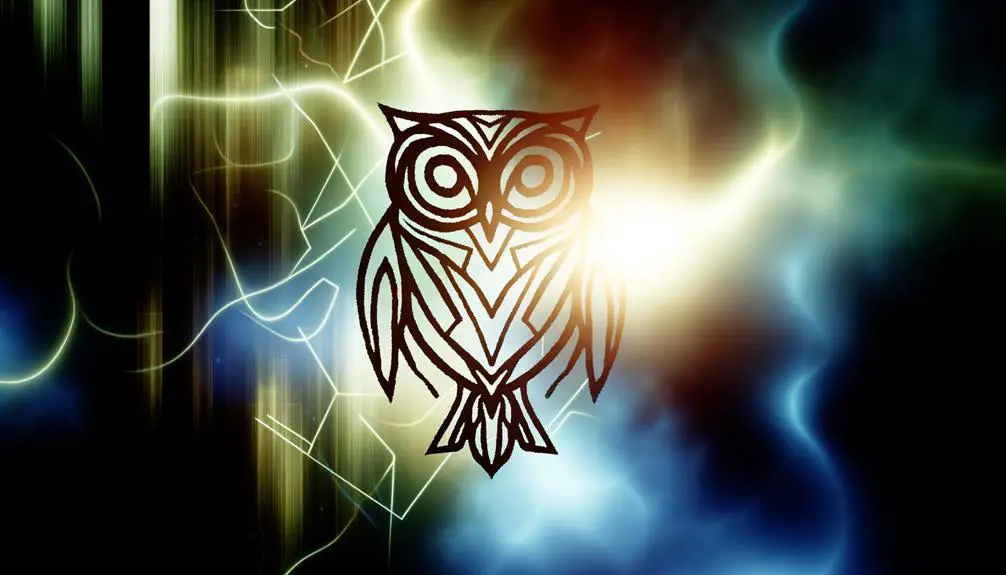
Owls are often regarded as harbingers of various omens, their presence or calls interpreted differently across Native American tribes. These interpretations can be multifaceted, reflecting the diverse cultural contexts in which they arise.
For instance:
- Warning of Danger: Among the Apache, an owl's hoot could signify an impending threat.
- Symbol of Wisdom: The Hopi may see owls as embodiments of knowledge and insight.
- Messenger of Change: Some tribes, like the Cherokee, perceive owls as indicators of transformation or significant life changes.
- Ill Omen: Conversely, the Navajo often regard an owl's call as a bad omen, foretelling misfortune or death.
These varying interpretations underscore the owl's complex role within Native American symbolism, highlighting the importance of contextual and cultural understanding.
Connection to the Afterlife
In various Native American traditions, owls are believed to serve as intermediaries between the physical world and the spiritual domain, often guiding souls in their journey to the afterlife. This symbolic association is deeply rooted in the cultural and spiritual narratives of tribes such as the Hopi and Apache.
Owls' nocturnal nature and keen perception are seen as qualities that transcend the ordinary, enabling them to navigate the in-between space between life and death. These birds are often revered for their ability to communicate with spirits, providing insight and guidance to both the living and the deceased.
Through this lens, the owl becomes a powerful emblem of transformation, embodying the delicate balance between existence and the hereafter.
Lessons From the Owl
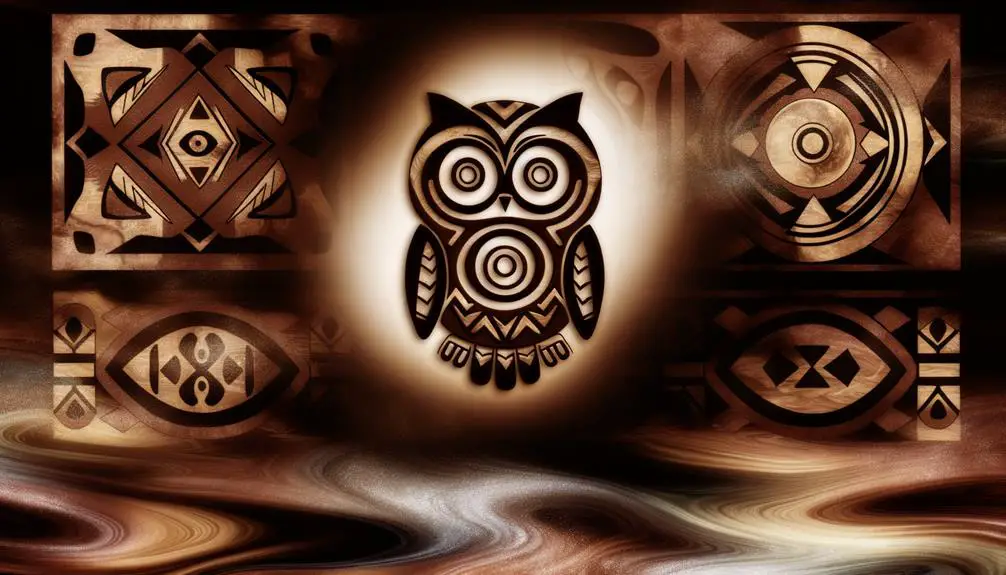
Drawing from their profound symbolism, owls impart several key lessons that are integral to understanding Native American spiritual and cultural teachings. These lessons are deeply embedded in the traditions and practices of various tribes, reflecting the owl's unique attributes and behaviors.
- Wisdom and Knowledge: Owls are often seen as symbols of wisdom, providing guidance and insight.
- Perception: Their exceptional night vision represents the ability to see what is hidden or overlooked by others.
- Change and Shift: Owls are associated with life's shifts, helping individuals navigate through different phases.
- Protection: Serving as guardians, owls are believed to protect against negative energies and evil spirits.
These elements collectively enrich the cultural tapestry and spiritual framework within Native American communities.
Conclusion
The owl, as a Native American symbol, embodies multifaceted meanings across various tribes, including wisdom, spiritual significance, and protective foresight.
Its connection to omens and the afterlife further enriches its cultural depth.
The theory that the owl functions as a wisdom keeper is supported through its consistent portrayal in tribal lore and spiritual practices.
This analysis underscores the owl's profound role in Native American belief systems, offering a window into their intricate worldviews and philosophical understandings.




